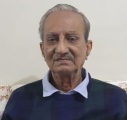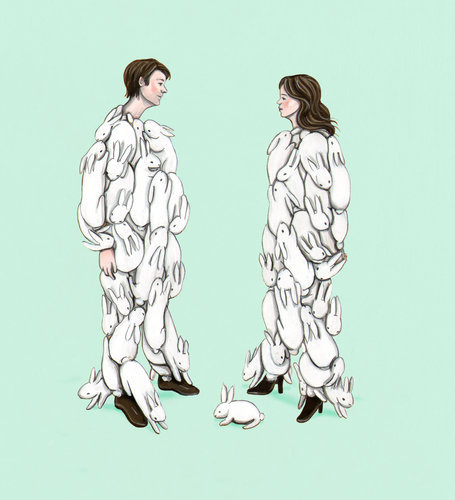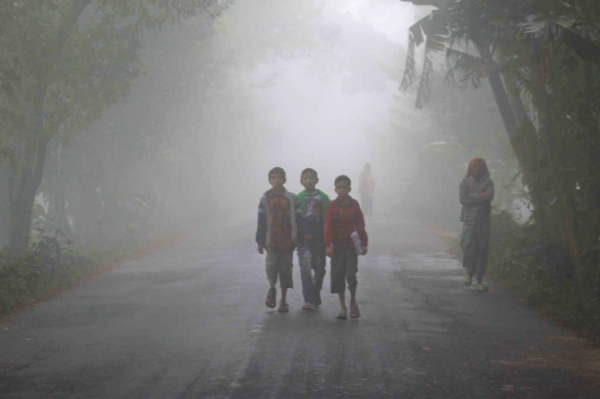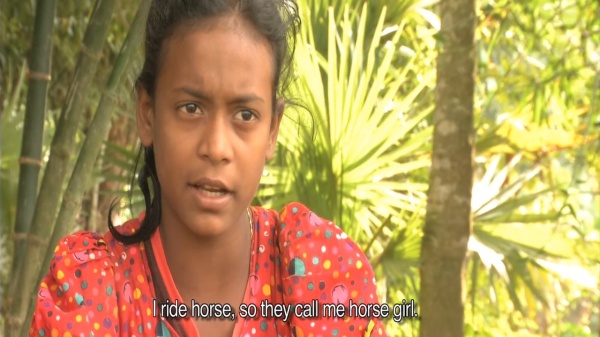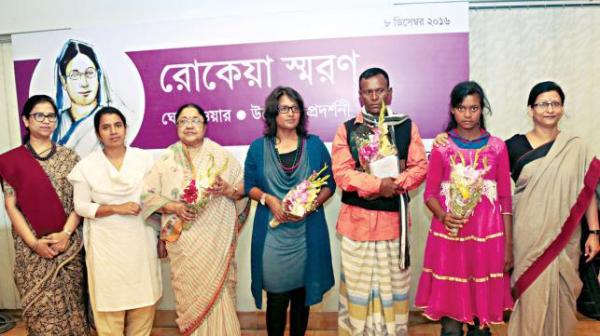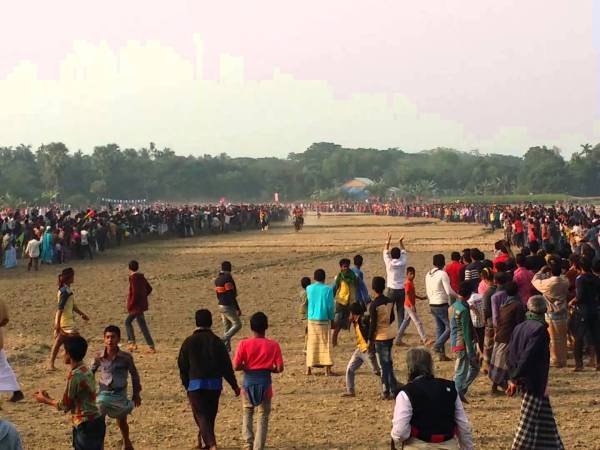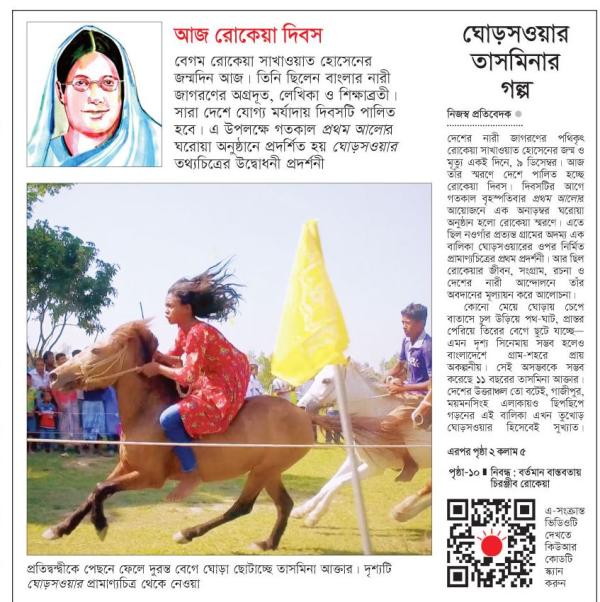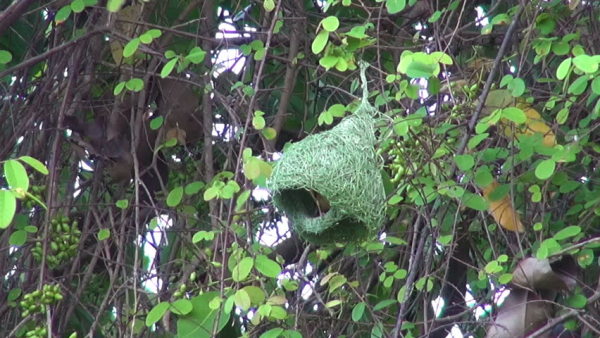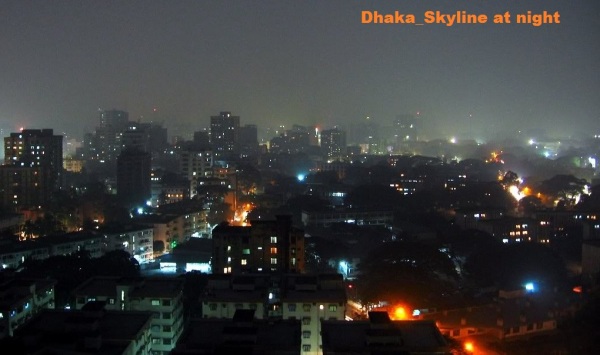 Tormenting Times!
Tormenting Times!
|
Posted:Dec 23, 2016 6:12 am
Last Updated:Nov 28, 2021 10:28 pm 10971 Views
|
Tormenting Times!
My friend always believed in what Abraham Lincoln once said about the common people. Lincoln said as under:
“Common looking people are the best in the world: that is the reason the Lord makes so many of them.”
Keeping in the mind what Lincoln said, my friend always endeavored to develop friendly relationships with common men and women irrespective of their cast or creed throughout the life that he had spent so far!
His choice did not go wrong till few days back when he was shocked to discover that his choice of a person may finally turn up as a wrong choice made by him four years back. Yet he hopes that it would not turn up as such as they still seem to like each other very much in spite of the fact that the contents of her recent text to my friend has put his life into a state of utter confusion.
He had chosen this person from a social site soon after he got himself registered in the site as advised by one of his overseas banker friend living in Canada. The chosen one was a lady who greeted him eagerly on the third day he visited the site.
He however, can’t tell now why he liked the lady so much after reading her first few words posted on the chat screen without looking at her picture even!
When he ponders now on the words spoken by this wonderful lady on the very first day they met in the chat room of that site, he can safely say that his judgment was probably based on the assumption that the lady must be one of the common women with whom he could exchange views!
However, he feels now that it was unwise for him to make a hasty decision at that time!
He thinks now that he should have waited some more time to ascertain whether they two believe in same things that would take them hand in hand ultimately to their destination together!
He does not blame his friend for what she told him because he believes that she has the right to tell what she thinks as correct even if her views may not be acceptable to common people who value relationship between a male and a female some thing as sacred and different than what she believes.
He tried his best to make his lady friend agree with him that cross- sex friendship and cross sex emotional relationship is completely different and as such the later should be given more importance and priority for obvious reason if the pair wants to remain emotionally involved with each other. He talked more than three years on the subject from time to time with his lady love but in vain. He now believes that he has failed measurably to make his friend agree that when a man and a woman spend more time with each other, they seek to develop a kind of “Chemistry” between them in order to cement the bond of relationship to last until the end of their existence!
My friend now knows after receiving her friend’s mail why he failed to convince his lady friend to accept his views that all must give preference to preserve emotional relationship over friendship.
All the times, during the last 1226 days, they talked and talked hours together but never succeeded to understand what the two wanted so long from each other!
All my friend’s life, he wanted someone to make his world beautiful and not someone who thinks that she is beautiful in the world and as such she is unwilling to prevent others irrespective of their numbers to make her world beautiful by loving and adoring her!
The purpose of my putting up this article is to understand whether opposite sex friendship of one partner should be overlooked when two such persons of opposite sex are also involved in emotional relationship with each other!
May be, some of the readers of this article can say a few words to make me understand the whole thing!
This article has nothing to do with my friend’s lady friend as he respects her even though he had been unable to accept her contention that both the partner should be allowed to develop cross-sex friendship, especially when one of the two is adored and liked by many people of opposite sex!
In view of what have been stated in the foregoing paragraphs at above, tell me please your considerate opinion on the problem!
Should we accept the friendship between men and women without any question when one of these two could also be grossly involved in emotional relationship with someone else beyond the knowledge of either his or her friend or lover?
What should be the bottom line in such situation according to you?
Being human beings, could we continue at all for a longer period in opposite sex friendship without the possibility of catching either feelings or awkward moments?

|
|
|
3
Comments
|
|
 The Legacy of Archer Kent Blood.
The Legacy of Archer Kent Blood.
|
Posted:Dec 20, 2016 7:24 am
Last Updated:Nov 18, 2022 11:34 pm 9920 Views
|
The Victory Day
We celebrate December 16 as our Victory Day. On this day, 45 years before, the ruthless marauding Pakistani Armed Forces personnel (90000 thousands of them), including their leaders had surrendered to the joint command of Indian Armed forces and Bangladesh Armed Forces at the Ramna Race course of Dhaka in the afternoon!
I feel proud to say that I had the opportunity to watch the ceremony joyfully along with thousands of Bangladeshis who were also present there.
While celebrating the day, we always remember now the silent contribution of an American Diplomat who was a true friend of the unarmed Bangladeshi civilians, who were being butchered by the marauding Pakistani military systematically. This American diplomat who had no previous interaction with us jeopardized his own career for us.
Who is this American Diplomat who will always be remembered by us?
He is none other than Archer Kent Blood., the then mid level Foreign Service officer stationed in Dhaka, the capital, during the war of our liberation.
I take this opportunity to paste here under an article written by Ellen Barry
telling us about this great man who risked everything for the suffering humanity:
Online Desk
Written by Ellen Barry.
On a recent visit to Bangladesh, around the anniversary of its hard-fought war of independence from Pakistan, I conducted an experiment.
Stopping a group of teenage boys at a museum devoted to the 1971 war, I asked them which American leaders had played an important role in that conflict. Henry A. Kissinger? They looked at me with blank faces. Edward M. Kennedy? Nothing. Richard M. Nixon? Crickets.
I was running out of names when I tried one more: That of a midlevel Foreign Service officer stationed in Dhaka, the capital, during that war. It was the name of a man who was recalled to Washington hastily and whose career would falter on his way to an ambassadorial post. What about Archer K. Blood, I asked? And one of the teenagers gave me a big, delighted smile of recognition.
“Archer Blood,” he said, “was a true friend of Bangladesh.”
This exchange came to mind when news broke this month that 51 American diplomats had signed an internal memo sharply critical of the Obama administration’s policy in Syria, and had filed it through the State Department’s designated “dissent channel.”
To many, the fact that the State Department has a dissent channel was news in itself. What sort of bureaucracy would devote an elaborate formal pathway to carry the message that the boss is wrong?
This mechanism, introduced in 1971, allows diplomats to directly protest American policy to the secretary of state. No other government bureaucracy has anything like it. It has been used to call for action to stop ethnic cleansing in Bosnia, to register opposition to the invasion of Iraq, and, now, to urge a tougher policy toward Bashar al-Assad, the president of Syria.
And it was a mechanism that signally changed the life of Mr. Blood, whose dissent cable, the first ever sent, called on Washington to condemn its ally Pakistan’s bloody assault on Dhaka.
On the spring day when I visited Bangladesh’s Liberation War Museum, Mr. Blood was enjoying a sort of vogue. In 2013, newly declassified documents had become the basis for Gary J. Bass’s prizewinning history, “The Blood Telegram: Nixon, Kissinger and a Forgotten Genocide,” which cast his dissent in heroic terms.
The United States government, in recent years, has been eager to embrace Mr. Blood. The story of his cable is part of the curriculum for incoming foreign service officers. Among the first acts of the current ambassador to Dhaka, Marcia S. Bernicat, was to present Bangladesh’s government with an official copy of the so-called Blood telegram, calling it a “reminder of the value in voicing dissenting views against existing power and authority structures.”
If Mr. Blood, who died in 2004, became a sort of poster for dissent, it is partly because he proved to be correct, on both practical and moral grounds. In 1970, he had been appointed United States consul to what was then East Pakistan. But Pakistan’s control was slipping: Bengali nationalism was surging through Dhaka. Pakistan was flying in more and more troops. Its officers were on edge.
When Pakistan’s military began its assault on March 25, 1971, Mr. Blood’s staff was virtually paralyzed, but two officers managed to reach a wireless transmitter to report the carnage to the State Department. The reports infuriated Mr. Nixon and Mr. Kissinger, who were then seeking Pakistan’s assistance in opening up communications with China.
Mr. Blood’s cables became increasingly angry.
“Full horror of Pak military atrocities will come to light sooner or later,” he wrote, in a cable that was headed, “Selective Genocide.”
On April 6, frustrated by the lack of response from Washington, a young political officer wrote up a formal dissent cable, using a brand-new format that had been devised in response to internal turmoil over the Vietnam War. It was the first ever submitted to an American secretary of state.
But no one knew whether Mr. Blood would endorse it; as the ranking official in the mission, he had the most to lose. Mr. Kissinger’s fury did focus on the consul, Mr. Bass recounts. He was swiftly transferred to Washington, to a position in human resources.
The cable had no discernible effect on Washington’s policy, but it irreparably damaged Mr. Blood’s career. By the time he received another foreign posting, he had “lost career time” and never became an ambassador, said Howard B. Schaffer, one of 29 diplomats who signed the dissent cable in 1971.
“I found it remarkable that in the years I worked with him he never expressed any bitterness about the treatment meted out to him,” said Mr. Schaffer, who was later appointed United States ambassador in Dhaka.
“The only time I was aware that he did so was at his retirement ceremony.”
I grew up around American diplomats. My father was one of a wave of young men who joined Foreign Service in the 1960s, under the influence of John F. Kennedy, and he served until his retirement, more than 30 years. I knew they could be sent into exile for vocally challenging American policy— this, in retrospect, accounts for the formative years I spent in Bulgaria. I also knew they did it routinely.
So Mr. Blood’s story held personal interest, in part because he chose the perilous course of challenging a policy from inside the system. Would his act of protest have been more effective if someone had leaked the cable to The New York Times? Would it have been better for him to resign in protest, to make a racket, rather than sit back and watch his bureaucratic punishment unfold?
In fact, during the 40-year history of the dissent channel, the cables have had little or no direct impact on policy, say researchers who have reviewed them. Hannah R. Gurman, who has written extensively on the subject, says the mechanism has succeeded mainly at “quelling internal dissent in a way that the public could actually support.”
But this deflating view will not get you very far in Dhaka. Mr. Blood’s cable means something to the people of Bangladesh. They see it as confirmation that someone, in the heart of the system, was arguing their case. I don’t know, but I imagine many Syrians feel the same way.
Not long after the United States presented Bangladesh with a copy of Mr. Blood’s cable, I sat down for an interview with Gowher Rizvi, a distinguished adviser to the country’s prime minister. The governing party was in the late stages of sidelining its opposition, and my questions were mostly spiky and unwelcome, but when I brought up the famous 1971 dissent, Mr. Rizvi lighted up.
“This is my personal feeling: The U.S. is, at the end of the day, an open society, so they respect these things,” he said. “I sometimes feel like criticizing them for many things. We criticize America, I suspect, because we hold America to America’s own standards.”
This article was published in the New York Times.
We remember you Archer Kent Blood.

|
|
|
3
Comments
|
|
 A barking takes center stage!
A barking takes center stage!
|
Posted:Dec 17, 2016 9:12 am
Last Updated:Feb 23, 2017 2:54 am 12150 Views
|
One of the Akitas!!
Yume is not a human being. She is a female Dog. The was presented by Akita Prefecture in 2012 to one of the most powerful man of the present day world whose fighter bombers are killing innocent citizens of Aleppo indiscriminately every day and night!
The owner of Yume is none other than Vladimir Putin, the Russian President.
Yume has become a famous barking in the world after she took center stage at a media interview recently! Putin brought Yume into an interview ahead of his visit to Japan this week with Japanese journalists and the large Akita breed made sure she as well as her master were well heard.
Yume was not on a leash, entered the room quietly and began barking soon loudly at the media crew.
According to a Kremlin transcript of the interview, one of the Japanese journalists said that they were glad to see Yume happy and cheerful. However, they were a bit surprised and afraid that the beginning of the interview would be like that!
Putin said Yume was protective of him.
"You were right to take caution, Yume is a no-nonsense dog," he said.
"There are many people here, with camcorders running, lights shining and cameras clicking. She is being a guard dog."
I wonder whether Yume would accompany President Putin during his Japanese visit this week! And if she would then will she enjoy diplomatic immunity like her master!!
Readers can view below the photo of President Vladimir Putin playing with Yume before giving an interview to Japanese Nippon Television and Yomiuri newspaper at the Kremlin in Moscow, Russia. Photo: Reuters

|
|
|
11
Comments
|
|
 Not A Brain Teaser.......
Not A Brain Teaser.......
|
Posted:Dec 16, 2016 3:42 am
Last Updated:Mar 15, 2017 1:35 am 11492 Views
|
Just for a smile!
Here below is another teaser sent to me by my boyhood friend living abroad who likes to tease me all the times!
“The capability to grab any woman’s attention and have them come running in just three whistles belongs to …?”
The answer is………… (You need to fill the blank up and post it in response)
Maybe, you might have read other versions of this particular teaser also but this one sounds wonderful and funny to me!
Season’s Greetings and Happy Holidays to you all.

|
|
|
8
Comments
|
|
 HE CRIED AND MADE PEOPLE CRY
HE CRIED AND MADE PEOPLE CRY
|
Posted:Dec 14, 2016 2:30 pm
Last Updated:Jun 11, 2017 6:18 am 11660 Views
|
HE CRIED AND MADE PEOPLE CRY
The appended picture made me emotional without any reason whatsoever when I first viewed the picture in today’s local English Newspaper on the internet. Maybe, the facial expression of the man carrying the little girl made me emotional. Then after clicking once on the picture, the caption of the photo and the text that followed it, appeared on the screen for me to read. And what I read on the screen made me more emotional and I could not keep the tears away any longer. The action of the man made me cry in joy.
The man seen in the picture carrying the little girl to safety is a Police Man. He is not a big shot in the police force either. He is a constable working in the detective branch of the police force!
I have never seen in my long life a police man pouring out such emotion and crying too while performing his duty! These people are not trained for showing emotion or crying while doing a job!
The caption of the picture and the text that followed it is pasted below without any editing whatsoever for viewers to read and react!
Quote…..HE CRIED AND MADE PEOPLE CRY
She is in no way related to the man. Yet, Mohammad Sher Ali, a constable of the Detective Branch of Chittagong Metropolitan Police, cried for Umme Habiba, victim in a road accident, as he carried her away. The girl was trapped under a bus that flipped over on Cox's Bazar-Chittagong highway at Panirchhara in Ramu. She was rescued after three hours of efforts by the army, police and locals. The picture of Sher Ali overcome with emotion, running with the girl has sparked an outpouring of admiration and love for him on the social media. The girl is out of danger now. Photo: Collected…….Unquote
Mohammad Sher Ali, we are proud of you and we need many more like you.

|
|
|
10
Comments
|
|
 Speaking Through Silence!
Speaking Through Silence!
|
Posted:Dec 13, 2016 11:25 am
Last Updated:May 9, 2020 10:51 pm 11616 Views
|
History constantly reminds us about our past! It is a way for us to remember what happened during the time we left behind. Important events happened long before we were born can be found written vividly in the history books.
But nothing better can help us to travel down the memory lanes than the photographs of these events—be it black and white or colored!
This is my opinion. Because, photographs speak thousand words silently whether we like them or not like them.
Now let us consider viewing the photographs of some important events posted below and ponder on the impacts of these events left on the people of the world as a whole!
A short note on each of the photographs:
1. Camels walking near the burning Kuwaiti oil fields that had been blown up by retreating Iraqi troops, 1991.
2. An oil lake and devastated desert landscape in the burning greater Al Burgan oil fields in Kuwait after the end of the Gulf War in May of 1991. More than 700 wells were set ablaze by retreating Iraqi troops creating the largest man-made environmental catastrophe.
3. The Beatles at the time of their iconic Abbey Road shot.
4. Fidel Castro plays baseball, 1959.
5. A Coca Cola Delivery truck 1909.
6. An American evacuee punches a South Vietnamese man during the evacuation from Saigon!
7. Howard Hughes inside of the H-4 Hercules, the largest Airplane at that time.
8. Interior of a London Pub1898.
9. The slums of Washington DC 1940.
10.Charlie Chaplin and Mahatma Gandhi.

|
|
|
7
Comments
|
|
 Good Morning ,Dhaka.
Good Morning ,Dhaka.
|
Posted:Dec 12, 2016 9:32 am
Last Updated:Dec 13, 2016 9:19 am 10961 Views
|
Foggy Morning City Scenes.
Winter has finally arrived in my city slowly but surely! And along with it came fog as usual.
We all know what fog is and why and how fog occurs?
Fog is nothing but a dense layer of cloud at ground level and it occurs when air temperature becomes identical, to the dew point. There are many other reasons that can cause formation of fog.
Heavy fog usually reduces visibility to less than 1 km or 0.62 miles. It is better to avoid driving during heavy fog at night or in the morning until visibility improves considerably! We must keep in mind that driving in fog is not only difficult but also dangerous too.
The worst times for fog is at night or during early morning hours.
Winter is not very severe in this country of mine.
But heavy fog usually keeps us closed inside our homes during night and in the early morning for obvious reason. We avoid going out of our homes either in a foggy night or in a foggy morning unless we have absolute urgency for going out.
The photos of foggy mornings posted here below will tell the viewers about the outdoor activities of our city people who are obliged to go out in the fog!

|
|
|
4
Comments
|
|
 A Girl And Her !
A Girl And Her !
|
Posted:Dec 10, 2016 11:55 pm
Last Updated:May 19, 2021 8:57 am 10991 Views
|
Tasmina the girl!
The title of this story seemed to be wrong. The girl had no of her own when she came into the lime light. But she used to race horses whenever opportunity would present itself.
Tasmina , known as the girl in her neighborhood, is 11 years old and comes from a remote village of Northern Bangladesh.
This is a place where more than half of the parents would prefer to see their daughters get married before their 15th birthday.
Tasmina seems to be different! She likes to ride horses in a country where racing was simply unthinkable for a girl even a few years back!
Tasmina aspires to ride horses and join races arranged in different Northern districts of Bangladesh during winter season as an outdoor contesting event, at least for next five years!
We came to know about this extraordinary village girl after Tasmina’s story was first published on June 17, this year in a local Bengali Newspaper, titled “The sad story of a racer”.
The story was apparently titled sad because Tasmina had no of her own. Yet, the 5th grader Tasmina, managed to take part in the races for last three years in a row by racing horses owned by other people and won the races always!
However, the prizes she won did not go to her house, rather the prizes went to the owners of the horses! This is why the paper probably considered Tasmina’s story as a sad one!
Perhaps, her days of racing other people’s horses have fortunately ended by this time, as the newspaper owners had decided to provide her with a white .
Recently they have shown a documentary on Tasmina Aktar in a program arranged by the newspaper where Tasmina and her father were also present! (Photo # 5)
The documentary made on her by Tanha Zafreen, showed eleven year old Tasmina “riding a speeding , flying hair, and passing fields… The documentary has also showed her ran past all the male contenders, and moves forward.”
Tasmina intends to continue her studies and desires to be a police officer. It may also be mentioned here that another documentary made on her by Faridur Rahman titled “Tasmina the girl” was being shown at Olympic Film Festival which ended yesterday.
Thank you all who have since read this story. By the by, this blog happens to be the 200th of mine posted on my blog page of this site! Thanks again for bearing with me so long!
Seasons’ Greetings and Merry Christmas.
Source; Prothom Alo

|
|
|
9
Comments
|
|
 A Bird Called Babui.
A Bird Called Babui.
|
Posted:Dec 9, 2016 10:48 am
Last Updated:Feb 20, 2024 12:16 am 10741 Views
|
Baya Weaver Is A Weaver Bird.
Tonight I am going to post a short write up and upload ten different pictures of two small sparrow-sized birds, both male and female, known locally as “Babui”.
Some of the picture would show the interested readers how usually a male Babui diligently builds the delicate nest where the birds live. The Babui nest looks like a hanging retort woven from fine leaf fibers, grass, twigs, long strips of paddy leaves, rough grasses and long strips between 20 and 60 cm in length, torn from palm fronds.
The male birds weave the nests apparently to lure prospective females. The weaver birds like to live together near to water bodies and as such their colonies can be found in such places!
The Babui or the Baya Weaver is found across the Indian Subcontinent and Southeast Asia including Bangladesh. In my country, flocks of these birds can be found everywhere, especially in open grasslands and cultivated lands besides other places where they can find seeds and grains to eat. They do sometimes damage ripening crops and as such they may be considered as pests!
It is needless to describe a male or female weaver bird as the uploaded pictures would speak for themselves! They look like house sparrows. However, non- breeding males and females look alike! The baya weavers forage in flocks for gathering foods. They fly in formations performing complicated maneuvers very often. They also sometimes indulge in dust bathing.
The baya weavers, both males and females, are polygamous. The nest built by the male bird is not completed until it finds a mate!
Their breeding season is during monsoon! The Birds are reportedly docile and intelligent.
Those who are interested to know more about these birds’ behavior and ecology, and breeding, may go to internet. Meantime, the uploaded ten pictures could be seen here under.
Photo#2. Male Baya Weaver.
Photo#3. Female Baya Weaver.
Photo#4,#5 &;#6. Baya Males at Work.

|
|
|
6
Comments
|
|

